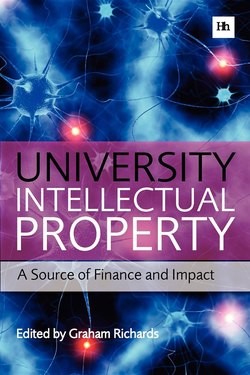Читать книгу University Intellectual Property - Graham Richards - Страница 10
На сайте Литреса книга снята с продажи.
Copyright
ОглавлениеIf the situation with respect to patents is less than totally satisfactory, then the copyright situation is even more in need of clarification and change, although when this occurs it is certain to generate opposition, especially if the university has a share in or ownership of the copyright.
When a scientist working in a university laboratory discovers something which leads to a patent, it is now generally accepted that both the researcher and the employing university should share the rewards on an equitable basis. If, on the other hand, one of the colleagues of the inventive scientist spends all his or her time writing text books on the subject for which they are paid to teach and do research, then universally the royalties go wholly to the author. This does not seem fair because the sums of money can be quite considerable; there are academic authors who earn hundreds of thousands of pounds per year from writing standard texts. This is very much what academics should do, but it seems far from clear why synthesising a molecule of commercial value should lead to income sharing while writing books or articles should not. Why should universities own patent rights but not copyright?
Of course it is somewhat complicated by the fact that academics do not have set hours of work. The boundary between what is really part of one’s duties as a lecturer or professor and what is totally outside employment in a specific department is very fuzzy. However, if one takes the case of an academic historian, hired to cover a set period of history, who then writes books on this topic and makes magnificently remunerated television programmes, then it is hard to see why the employer should not derive some benefit.
A further level of complexity is now developing as a result of the internet and the use of IT by lecturers. Increasingly the contemporary student does not like lectures using traditional talk and chalk. Blackboards are even considered to provide a health and safety hazard. White boards and the provision of lecture notes on the web in the form of handouts are now expected. But who owns these lecture notes, the lecturer or the employing university? Some of these notes will be downloaded from the internet by lecturers at universities in other countries, either directly or via students who move on to teaching posts. Once more it is hard to see why there is any essential difference between this type of work and scientific research, given that the formal duties of the academic are to teach and to do research. If the university were to own the teaching materials then they can employ a mechanism whereby the content is protected and exploited to the mutual benefit of both author and employer.
